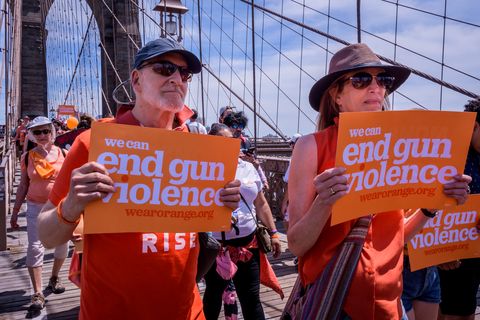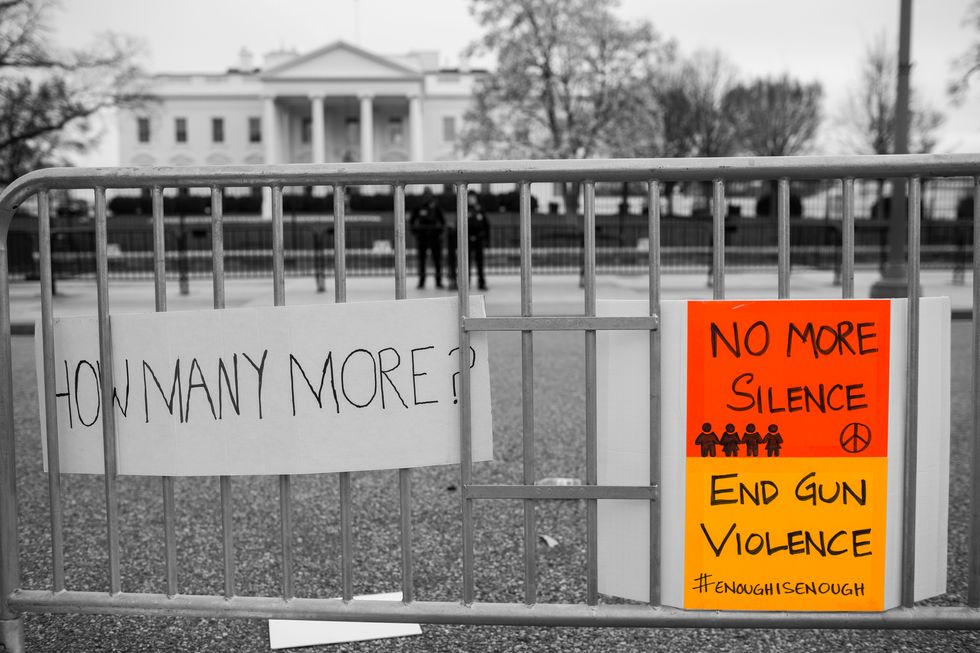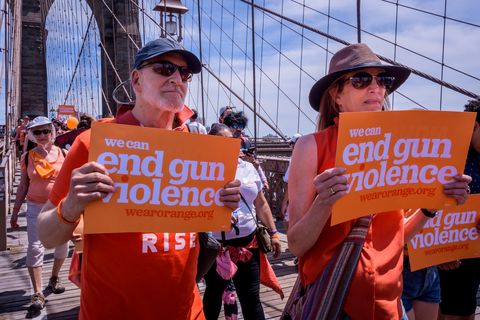As a Survivor of Gun Violence, I Know Change Is Possible
I never thought of myself as a survivor. In fact, I was told over and over again that I wasn’t one. “You weren’t there!” they said. “Who are you to say that you’re a gun violence survivor?’’ In one way, they’re right—I wasn’t there that afternoon. But that day will live loudly within me forever.
On Sept. 11, 1995, my sister-in-law, Laura, and my three nieces, Sarah, Rachel, and April, were shot and killed by Laura’s husband, the girls’ father. April was just five months old when she was murdered. Sarah, the oldest, had just gotten home from her first day of kindergarten. It was supposed to be a day of celebration, but feeling like he had missed out, my brother-in-law broke into my mother-in-law’s home and shot and killed Laura and their three daughters. My mother-in-law was wounded trying to protect one of her grandchildren.
I may not have been present when the shooting took place, but I was there that night cleaning the blood out of my mother-in-law’s hair. I acted as her ongoing caretaker as she battled the trauma for the rest of her life. Years later, I was there when my daughter was trying to find the strength to leave her own abusive relationship. And I’m still here—just like the millions of other survivors of domestic violence and gun violence.
When I received word of the shootings, I feared that I was next. I huddled with my three-month-old and two-year-old, waiting to hear what I should do, not knowing that my brother-in-law had been apprehended. If I, one step removed from the violence, felt this terror, what must my nieces’ and Laura’s last moments have been like?
For a long time, I didn’t tell our story because I thought it was just that—our story. I know what it’s like to be ridiculed or not believed, and even people within Laura’s evangelical community, including pastors, dismissed her concerns about the dangerous dynamic she was in. I have come to learn, however, that our story is America’s story, and I must tell it so that people do not turn away from the versions of it that exist in their own communities.
Across the nation, easy access to firearms, coupled with societal systems that aren’t built to protect women, allow this public health crisis to flourish. Access to a gun makes it five times more likely an abuser will kill his female victim. On average, 70 women are shot and killed by an intimate partner every month. Nearly one million women alive today have been shot or shot at by an intimate partner, while millions more have been threatened with a gun. Abusers use power to inflict emotional trauma and exert coercive control over their victims, and guns only exacerbate that power, even when abusers do not ultimately pull the trigger.
Like so many families in Uvalde, Buffalo, and hundreds of cities across the country will soon find out, the trauma of gun violence doesn’t go away after the shooting stops and the media cameras leave—if there are any cameras at all. As survivors, our families and communities hold the trauma from gun violence forever.
But this public health crisis isn’t inevitable. I have seen change happen. In March, President Joe Biden signed a government spending bill that included a bipartisan reauthorization of the Violence Against Women Act. This bill took critical steps to address the needs of survivors and built on the work the president started when he authored the first Violence Against Women Act in the 1990s. The Senate voted for the measure almost unanimously—showing me that bipartisan support for common-sense gun reform is achievable.
We must keep fighting to make sure our lawmakers are making our safety a top priority. That’s why this weekend, thousands of Moms Demand Action and Students Demand Action volunteers will be joining with survivors to honor those stolen by gun violence for the annual National Gun Violence Awareness Day and Wear Orange Weekend.
Wear Orange is dedicated to honoring the lives of people in the United States affected by gun violence and elevating the voices of those demanding change. The weekend originated in 2015 to honor Hadiya Pendleton, who was 15 years old when she was shot and killed in Chicago. Today, Wear Orange honors Hadiya and the more than 110 people shot and killed every day in the United States, as well as the hundreds more who are wounded.
Gun violence is an epidemic in our country that affects everyone in proximity to it: neighbors, classmates, teachers, friends, and family. No one is left untouched. No community is immune. As lawmakers, it’s time for you to commit to tending to all aspects of this crisis and prioritizing gun safety so that no auntie, sibling, parent, grandparent, or community member ever needs to know this kind of indescribable grief and loss.
It has long been the time for action. But you simply can’t wait anymore. Passing common-sense policies, like background checks and red flag laws, would keep guns out of the hands of those who shouldn’t have them. We can reduce gun violence in America, but we need you, our lawmakers, to stand with us.
Every day, I miss my nieces, but every day I get up ready to fight for them. In their honor, and in honor of a nation made of gun violence survivors, I implore you to stand with us.
This content is created and maintained by a third party, and imported onto this page to help users provide their email addresses. You may be able to find more information about this and similar content at piano.io



